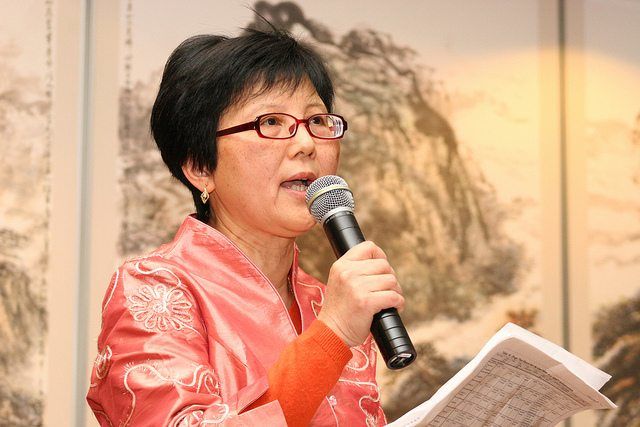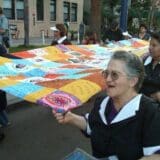

By Kate Sheppard
(This post originally appeared on Mother Jones .)
Climate Central has released a new in-depth report on the combined impacts of rising seas and storm surges. With rising water levels, more people and property are at risk—especially during storms, which force water farther inland. Here’s an excerpt from the executive summary:
Global warming has raised sea level about eight inches since 1880, and the rate of rise is accelerating. Scientists expect 20 to 80 more inches this century, a lot depending upon how much more heat-trapping pollution humanity puts into the sky. This study makes mid-range projections of 1 to 8 inches by 2030, and 4 to 19 inches by 2050, depending upon location across the contiguous 48 states.
Rising seas dramatically increase the odds of damaging floods from storm surges. For more than two-thirds of the locations analyzed (and for 85% of sites outside the Gulf of Mexico),


By Julie Chow
In a soon-to-be released report, the UCLA Center for Health Policy Research states, “Paid caregivers caring for recipients of Medi-Cal fare the worst in monthly income, job stability, home ownership, health insurance coverage, delays in obtaining medical care and food security. Data from the 2009 California Health Interview Survey suggest that paid Medi-Cal caregivers face hidden costs and are at risk for continued economic uncertainty.”
As a caregiver for over 10 years, and as part of my union’s Los Angeles contract committee, I can tell you that the statement above is more than accurate. We’ve heard from hundreds of our caregivers — their top concerns are job/wage security and access to quality health care. So, as we continue to negotiate with Los Angeles County, these are two of our top priorities.
We recognize that this economy has affected more than just ourselves; we see it in our neighbors,


Most of us – at least the 87 percent or so of us not protected by collective bargaining agreements – have to worry about job security. With only a few exceptions, all of us can be fired for any reason – or for no reason at all.
Two California news “scandals” brought this into sharp relief this week, as a couple of public employees found themselves under fire for some extracurricular activities.
In one case, Daniel Richards, president of the state Fish and Game Commission, shot and killed a mountain lion during a hunting trip in Idaho. In another case, some students discovered that Oxnard middle school teacher Stacie Halas had shot a porn video. Both are facing some degree of popular outrage, and calls for their dismissals.
First things first: No one has yet alleged that either of these two has violated any laws.
» Read more about: Hunting and Porn: Job Security in California »


You may have already heard that uber-retailer Walmart plans to open a 33,000 square-foot store in L.A.’s Chinatown.
Last week opponents of Walmart’s Chinatown store gathered at Sixth and Park View in MacArthur Park to listen to Walmart “associates”—the retailer’s preferred term for its employees—talk about their need for public assistance to make ends meet.
If you know L.A., you know MacArthur Park is nowhere near Chinatown. But it is across the street from a California Department of Public Social Services (DPSS) building—a place you’d go to apply for social services such as welfare and health care— for support you might need if you were employed at a poverty-wage job.
Support you might need if you work at Walmart.
There have been scores of news stories over the years about Walmart and the low job standards that rendered much of its workforce eligible for Medicaid.


This weekend I was visiting one of the many free museums in Washington, D.C. (a perk of living in this city) and found an incredible poster at the National Museum of American History. Weimer Pursell’s color illustration depicted a well-dressed man behind the wheel of a 1940s convertible — with the ghostly outline of the Führer sitting next to him; it implored Americans to save gas during World War II by joining a car pool.
“When You Ride Alone You Ride With Hitler!” the letters scream. It is one of the war’s most famous posters and, while it has been copied and parodied since then, its message of national sacrifice resonates to this day.
Imagine that: During World War II Americans were told that riding alone in a car was like riding with Hitler. Saving and conserving, and helping others, was lifted up — in this and many other posters —
We drove north out of Santa Fe, through Espanola and past Abiquiu, the village where the artist Georgia O’Keefe lived, until we reached a narrow road in the high country. Then we drove until we came to a dirt and gravel road that led another 10 miles to a small cluster of houses and buildings named Ganado, the Spanish word for “cattle.” My wife, Susan, would live for a week at an encampment with a hundred other women, creating rituals and raising consciousness — while I headed back to Santa Fe with a stack of books.
But when I picked her up, she was not happy. The conference had been great, and the women amazing, but the noise had kept her mostly awake day and night. Just over the hillock someone was digging for natural gas, and by day the trucks rolled through and the drilling machines whined, and by night the pumps roared and the pipes rattled.


Not long ago, I wrote about how the goods-movement industry uses threats about the Panama Canal to try to keep costs low on the West Coast docks. “Diversion!” they shout. It’s a not-too-subtle threat to move cargo from the West Coast – where wages and environmental standards are high – to the East Coast.
Well, try not to get whiplash from the latest warning cries from these same folks. According to leading trade publication The Journal of Commerce, an executive from a shipping line is now warning of possible cargo diversion—from east to west! The International Longshoremen’s Association represents dock workers on the East and Gulf Coasts, and they’re currently negotiating a new contract. Making the bosses nervous is the fact that the ILA has a new, tough-talking leader.
The JOC reports: “David Arsenault, vice president of Hyundai Merchant Marine,
» Read more about: Shippers’ Panama Canal Threat: Real or Bluff? »


The Pentagon’s defiant pledge to stick with the Rush Limbaugh show, no matter what, bumps up against a few hard and insulting realities. The Armed Forces Network that carries the Limbaugh show is not a private business, corporation, or proprietorship that can do whatever it pleases with its money, personnel, operations and policy. Every penny of the armed forces bloated budget comes from taxpayers. The Armed Forces Network, which has beamed the Limbaugh show for two decades, is oiled to the tune of an estimated $27 million annually. Every penny of which comes from the pockets of taxpayers. And since the military is not a democracy, and decisions are made top down, there was never any chance that taxpayers would have any say about the use of their money to subsidize the naked bias of one radio jock at public expense.
The same rule applies to those in the military that have had Limbaugh shoved down their listening palate.
» Read more about: What Budget Cuts? Tax Dollars Promote Rush Limbaugh’s Show »


Last week KCET television broadcast “Small Town, Big Oil,” an examination of Chevron Oil’s influence on the L.A. County beach town of El Segundo. The station’s SoCal Connected show featured an interview by correspondent Vince Gonzales with Frying Pan News writer Donald Cohen, who had written about the recent Chevron controversy, in which El Segundo’s city manager, Doug Willmore, was fired for suggesting the petroleum giant pay a level of local taxes on par with other California refineries. Cohen is also the director of the Cry Wolf Project.
Click here for the full transcript. Here is a sample:
Gonzales: What is the message coming out of city government?
Donald Cohen/Director, Cry Wolf Project: The message is that Chevron is the sheriff. They are in control. They ought to be ashamed of themselves and so should the members of the Council who voted to fire the city manager.
» Read more about: Frying Pan Writer on KCET's Chevron Exposé »


International Women’s Day has been observed since the early 1900s, a time of great expansion and turbulence in the industrialized world that saw booming population growth and the rise of radical ideologies. While we have made great strides for women’s rights in the home, community and workplace over the past century, we still have a long way to go.
But does simply marking the day do much for women’s lives? Not really. We need to engage community leaders and push our decision-makers to enact policies that ensure we’re constantly moving forward.
In Los Angeles, we have many sectors that employ a large percentage of women, including the hospitality industry. These women work daily to ensure that the 27 million visitors who visit our city annually have a great experience. They make sure the rooms are spotless, the beds are made perfectly and guests are greeted warmly.
Judging by the numbers,
» Read more about: The Inhospitable World of L.A.’s Female Tourism Workers »